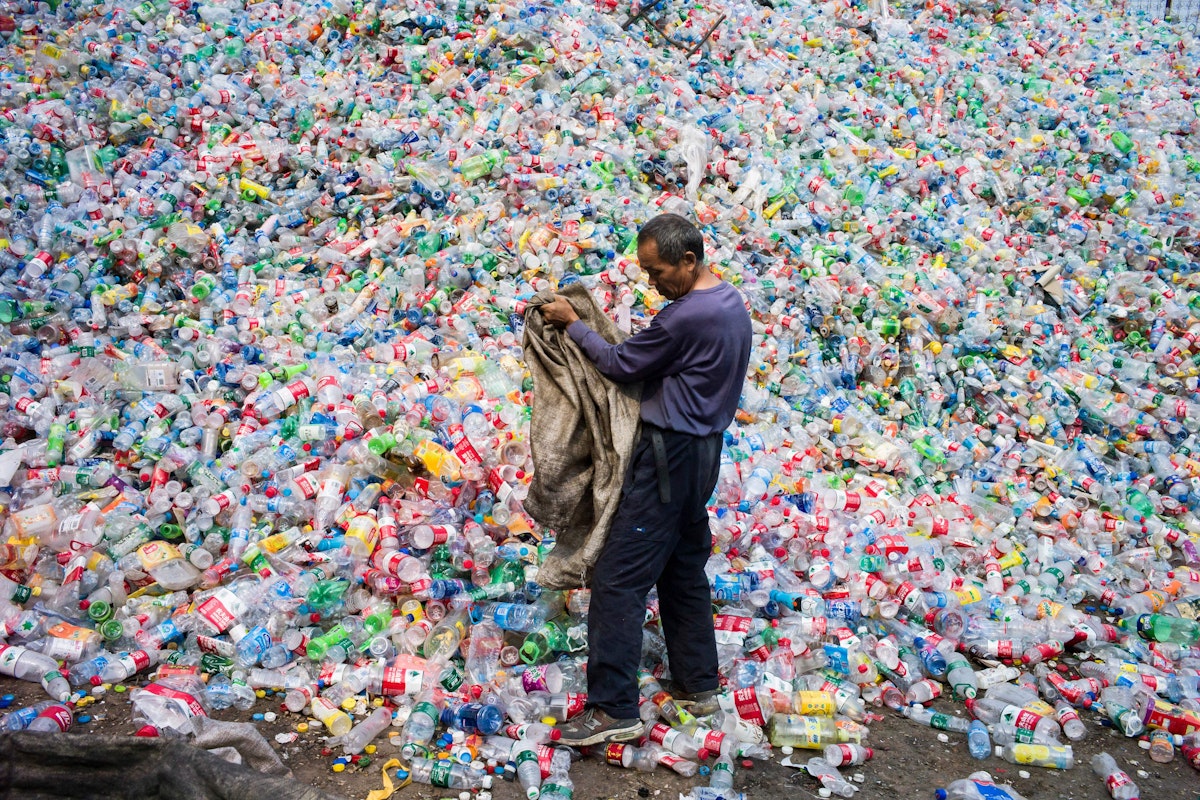Recycling Doesn’t Work—and the Plastics Industry Knew It
Hardly any plastics can be recycled. You’d be forgiven for not knowing that, given how much messaging Americans receive about the convenience of recycling old bottles and food containers—from the weekly curbside collections to the “chasing arrows” markings on food and beverage packaging. But here’s the reality: Between 1990 and 2015, some 90 percent of plastics either ended up in a landfill, were burned, or leaked into the environment. Another recent study estimates that just 5 to 6 percent are successfully recycled. While those numbers may surprise you, these sorts of statistics aren’t news to the companies that produce plastics. For more than 30 years, the industry knew precisely how impractical it is to recycle them, according to a new report from the Center for Climate Integrity. A trade association called the Vinyl Institute concluded in a 1986 report that “recycling cannot be considered a permanent solid waste solution” to plastics, as it merely prolongs the time until an item is disposed of.” Still, facing public backlash over the growing amount of plastics being incinerated and piling up in landfills, manufacturers and their lobbyists sold recycling as an easy solution, warding off potential legislation to ban or limit plastics. This, of course, has echoes of Big Tobacco and Big Oil, both of which withheld crucial information from the public for decades—causing untold damage to human health and the planet, respectively. Both industries are paying dearly for it. Is Big Plastic due for a similar reckoning?In some sense, a reckoning is already happening—just not (yet) because of the industry’s decades of alleged deception, disastrous environmental justice record, and mass proliferation of microplastics into human bloodstreams. At the beginning of this year, S&P Global found that the petrochemicals industry—responsible for producing the suite of typically oil- and gas-derived compounds known as plastics, as well as pesticides and industrial chemicals—faces uncertain prospects over the coming years. “Overall, global petrochemicals prices appear to have reached a peak in October and are forecast to grind lower into early-2024 following energy and feedstock prices lower,” the consultancy found, forecasting a “supply-drive surplus” through 2026.That all stands to make recycling even less practical than it already was, as recyclers already hungry to find buyers for the waste they collect now face a market where new plastics are a better bargain than recycled ones. After the shale revolution took off in the 2010s, companies rushed to build petrochemical facilities in the United States to make use of abundant, cheap gas. Those facilities are inordinately sited in low-income communities of color, where residents suffer from elevated cancer risks, respiratory diseases, and birth defects. Both the U.S. and China are now producing a surplus of the industrial chemicals, like ethylene, used to make popular plastics such as polyethylene, to the point that new (“virgin”) plastics are cheaper than recycled alternatives. So as recyclers struggle to offload discarded plastics, companies that have flooded the market with fresh plastic are having trouble making good on the major investments they’ve made to produce them.Among the biggest plastics producers in the U.S. are ExxonMobil and Shell. Shell opened a giant petrochemical plant in Beaver County, Pennsylvania, in 2022. On the company’s fourth-quarter earnings call, it admitted that costs for the project had soared 130 percent past the original estimates. An investigation by the Pittsburgh Post-Gazette found that, in the first year of the plant’s operations, its polyethylene units—which convert ethylene into tiny plastic beads—were shuttered as often as they were operational. Shell announced this week that it would be pulling out of talks to build a new petrochemicals plant in Basra, Iraq, having said it’ll cut down on “mega projects” like the Beaver County facility. Oil and gas companies, including big state-owned firms like Saudi Aramco, have placed major bets on petrochemicals. Industry trade associations like the American Chemical Council and the Plastics Industry Association have routinely lobbied to kill or weaken efforts to limit plastics usage and regulate toxins used in their production. Meanwhile, we’re learning more about what the industry knew, and when. It should be a national scandal, replete with lawsuits and Capitol Hill hearings, that the companies responsible for the microplastics in our food, our tap water, our oceans, our bodies, even our placentas—truly everywhere—have cooked up one of the most successful, destructive lies in U.S. environmental history. Plastics are a plague, and the executives who produce them should be made into pariahs.

Hardly any plastics can be recycled. You’d be forgiven for not knowing that, given how much messaging Americans receive about the convenience of recycling old bottles and food containers—from the weekly curbside collections to the “chasing arrows” markings on food and beverage packaging. But here’s the reality: Between 1990 and 2015, some 90 percent of plastics either ended up in a landfill, were burned, or leaked into the environment. Another recent study estimates that just 5 to 6 percent are successfully recycled.
While those numbers may surprise you, these sorts of statistics aren’t news to the companies that produce plastics. For more than 30 years, the industry knew precisely how impractical it is to recycle them, according to a new report from the Center for Climate Integrity. A trade association called the Vinyl Institute concluded in a 1986 report that “recycling cannot be considered a permanent solid waste solution” to plastics, as it merely prolongs the time until an item is disposed of.” Still, facing public backlash over the growing amount of plastics being incinerated and piling up in landfills, manufacturers and their lobbyists sold recycling as an easy solution, warding off potential legislation to ban or limit plastics.
This, of course, has echoes of Big Tobacco and Big Oil, both of which withheld crucial information from the public for decades—causing untold damage to human health and the planet, respectively. Both industries are paying dearly for it. Is Big Plastic due for a similar reckoning?
In some sense, a reckoning is already happening—just not (yet) because of the industry’s decades of alleged deception, disastrous environmental justice record, and mass proliferation of microplastics into human bloodstreams. At the beginning of this year, S&P Global found that the petrochemicals industry—responsible for producing the suite of typically oil- and gas-derived compounds known as plastics, as well as pesticides and industrial chemicals—faces uncertain prospects over the coming years. “Overall, global petrochemicals prices appear to have reached a peak in October and are forecast to grind lower into early-2024 following energy and feedstock prices lower,” the consultancy found, forecasting a “supply-drive surplus” through 2026.
That all stands to make recycling even less practical than it already was, as recyclers already hungry to find buyers for the waste they collect now face a market where new plastics are a better bargain than recycled ones.
After the shale revolution took off in the 2010s, companies rushed to build petrochemical facilities in the United States to make use of abundant, cheap gas. Those facilities are inordinately sited in low-income communities of color, where residents suffer from elevated cancer risks, respiratory diseases, and birth defects. Both the U.S. and China are now producing a surplus of the industrial chemicals, like ethylene, used to make popular plastics such as polyethylene, to the point that new (“virgin”) plastics are cheaper than recycled alternatives. So as recyclers struggle to offload discarded plastics, companies that have flooded the market with fresh plastic are having trouble making good on the major investments they’ve made to produce them.
Among the biggest plastics producers in the U.S. are ExxonMobil and Shell. Shell opened a giant petrochemical plant in Beaver County, Pennsylvania, in 2022. On the company’s fourth-quarter earnings call, it admitted that costs for the project had soared 130 percent past the original estimates. An investigation by the Pittsburgh Post-Gazette found that, in the first year of the plant’s operations, its polyethylene units—which convert ethylene into tiny plastic beads—were shuttered as often as they were operational. Shell announced this week that it would be pulling out of talks to build a new petrochemicals plant in Basra, Iraq, having said it’ll cut down on “mega projects” like the Beaver County facility.
Oil and gas companies, including big state-owned firms like Saudi Aramco, have placed major bets on petrochemicals. Industry trade associations like the American Chemical Council and the Plastics Industry Association have routinely lobbied to kill or weaken efforts to limit plastics usage and regulate toxins used in their production. Meanwhile, we’re learning more about what the industry knew, and when. It should be a national scandal, replete with lawsuits and Capitol Hill hearings, that the companies responsible for the microplastics in our food, our tap water, our oceans, our bodies, even our placentas—truly everywhere—have cooked up one of the most successful, destructive lies in U.S. environmental history. Plastics are a plague, and the executives who produce them should be made into pariahs.


